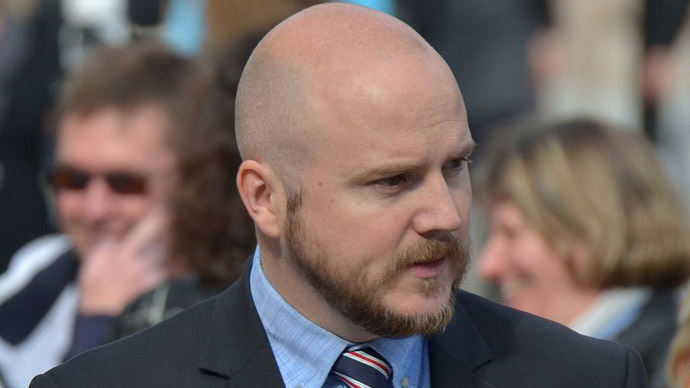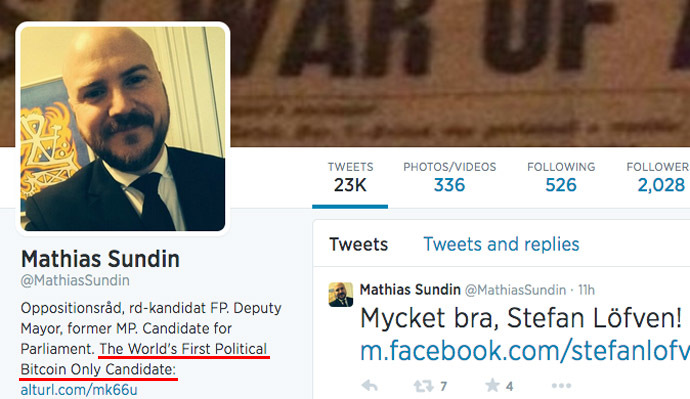‘World’s first bitcoin only’ candidate runs for Swedish parliament

While a number of politicians around the world have embraced the most popular digital cryptocurrency for fundraising, a candidate for the Swedish parliament takes it a step further and says he accepts nothing but bitcoins for his campaign.
“The World's First Political Bitcoin Only Candidate” -
that’s how Mathias Sundin, 36, the deputy mayor of Norrköping,
eastern Sweden and a member of the Liberal Party (Folkpartiet)
describes himself in his Twitter account.
“If you want to support my campaign, you can’t give me
dollars, euros or Swedish kronor, you must donate in
bitcoins,” Sundin writes in his blog.
In April, a candidate in local Irish elections, Ossian Smyth,
announced he was the first politician in the country to accept
bitcoins, saying this was “the most transparent ways of
receiving donations,” according to Siliconrepublic. A number
of politicians in the US earlier announced they were accepting
virtual currency as donations as well. They have not rejected
other ways of fundraising though.
Sundin believes exclusively sticking to bitcoin can help spread the digital currency. The politician also promises to “resist knee-jerk regulation of bitcoin, other digital currencies, and disruptive innovation in general,” if he is elected.

Earlier this year, Sweden’s central bank issued a report warning
of the risks that virtual currencies pose.
“There are clear disadvantages with virtual currencies,”
the report says. “Issuing these currencies is not subject to
regulation and the issuers are not under financial supervision.
This means that consumer protection is weak in certain aspects
and that the users may be exposed to risks.”
Sundin confesses he also used to be a skeptic in the past. What
made him change his mind was actually ordering pizza with
bitcoin.
“Personally, at first, I only saw the negative headlines
about bitcoin and thought it was some sort of unserious
speculation bubble,” he recalls. “Then I read up on it
and understood that it has the potential to change the world.
(Or, really, it was when I realised that I could order pizza and
pay in bitcoin).”
Trust in the digital currencies was put to the test earlier this
year, when the world’s largest bitcoin exchange Mt. Gox Co.
lost around 850,000 bitcoins ($500 million at
current prices), allegedly following a hacker attack. Later Mt
Gox said it had recovered 200,000 bitcoins.
Bitcoin’s reputation has also been tainted by the fact it was
used for purchases at the Silk Road black market website, which
offered goods ranging from Schedule I narcotics to highly illegal
weapons. The website was shut down and its alleged owner arrested in October,
2013.
Despite the big risks and setbacks, the popularity of the virtual
currency has been growing. The Bank of Russia has recently
signaled it is ready to legalize bitcoin, with a top official saying
“the instrument could be the future.”
California Governor Jerry Brown signed into law a bill making
alternative currencies, including bitcoin, lawful in the state. Authors of the bill said
they wanted the state to catch up with “growing and
innovative payments market.”
With the amount of publicity – good or bad – bitcoin receives,
making it a centerpiece of one’s political campaign might not be
that strange or unwise.














